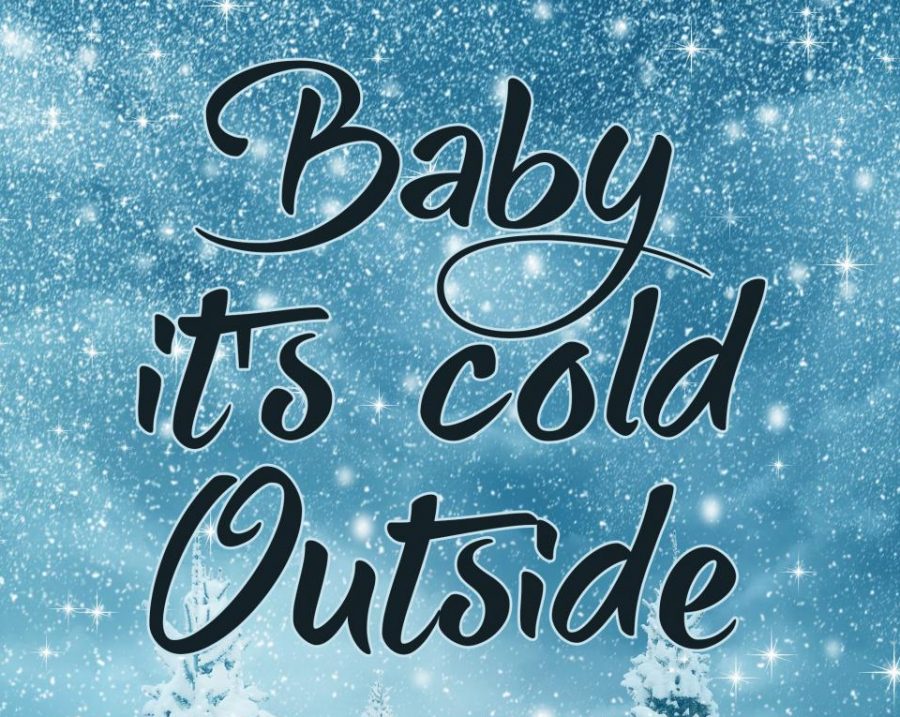A Caroling Controversy
Students Give Their Opinion On ‘Baby It’s Cold Outside’
Artwork of the main lyric of “Baby Its Cold Outside”
December 19, 2018
Perhaps one of the most familiar songs of holiday history has received extreme backlash for its possible rape culture connection resulting in its ban on several radio stations. Written in 1944, Frank Loesser’s, ‘Baby, It’s Cold Outside’ has attracted controversy about whether the song is intended to be a sexist ploy based on stereotypes and date rape or if the song is just another mere holiday classic.
One source of controversy is from some supporters of the #MeTooMovement campaigning the song to be sexist. The target of the movement is to prevent and reduce sexual harassment and sexual assault. For those who claim that the song portrays aspects of sexual aggression, they base their opinion on several lines in the song. A major misinterpretation, however, is that the controversy has solely come from those involved in the #MeTooMovement, for some students the song is eerie and after a few listens rather creepy.
“I know that there’s old context and new context but, I think the whole controversy is the wording of it because I think if you listen to it now it sounds really creepy, because of the context of her wanting to leave and the drink line,” sophomore, Channing Bowles, said.
Primarily the lines that have garnered the most negative attention are “The neighbours might think (baby, it’s bad out there)/Say what’s in this drink? (no cabs to be had out there)/I simply must go (but baby, it’s cold outside)/The answer is no (but baby, it’s cold outside)” While the lyrics are subjected to interpretation, the possible illusion to substance-related drugging has left listeners speculating the intentions of the song.
“It’s because people assume, he probably drugged it or that it is probably alcohol, it’s Christmas time more than likely this a song that adults make when adults throw parties, where there’s usually wine or Christmas related drinks like eggnog or milk,” sophomore, Patrick Deliz, said.
While the song exists under fire of controversy, radio stations such as ‘WDOK’ have removed the song from their playlist and refuse to air the song. For other radio stations who have banned the song from their track after a few days of debate the song has returned to their catalogue for airing.
“I don’t think they should ban it because I don’t think the writer had that meaning of that song, it’s not that meaning behind it, people don’t think about it and it makes me mad,” sophomore, Aliyah Helwig, said.
The degree of controversy from the song also brings up whether or not there is a double standard in the perception of music between teens. While for some students ‘Baby It’s Cold Outside’ is more than illusive to topics of sexual harassment or violence some wonder if the same stigma should be applied to other genres and songs.
“To an extent, there’s a difference between hidden messages in lyrics and explicit messages in music, such as in rap songs when they talk about doing things to women or having music videos that portray women in an over-sexualized way,” junior, Kayla Montana, said. “It just depends on the song, and what they portray and whether it is said implicitly or explicitly.”
While ‘Baby It’s Cold Outside’ exists under controversy, the song for some is a vintage track to play during the holiday season. For others, the song is a simple skip from their holiday playlist or car ride home amidst the debate.
“If it comes on and I’m not in control of the radio station I’ll tolerate it, but I don’t really listen to Christmas music in general,” Bowles, said.



